Today, Muslims throughout the Islamic world celebrate Eid al-Adha, which is one of the most prominent religious celebrations in Islam and coincides with the performance of the Hajj pilgrimage in the Holy Lands of Mecca.
This occasion is characterized by profound social and religious aspects, as Muslims slaughter sacrifices and distribute them to the poor and needy, and exchange congratulations and visits between family and friends.
Travels in Middle Eastern countries such as Saudi Arabia, the Emirates, and Egypt are characterized by distinctive dishes such as “Fatta” and “Mambar,” where Fattah is a main dish consisting of meat, rice, and red sauce, while Biryani is very popular for its wonderful combination of rice, meat, and spices.
In North African countries such as Morocco and Algeria, Eid al-Adha is characterized by the “steamed wheat flour” dish, which combines meat, vegetables and spices in an earthen pot, to form a dish with a distinctive flavor and delicious texture.
In addition to delicious foods, the celebrations are characterized by religious rituals such as Eid prayers, performing Hajj rituals for those who performed the Hajj, and exchanging congratulations and visits between family and friends to strengthen the bonds of love and brotherhood among members of society.
Eid al-Adha celebrations reflect the diversity of Islamic cultures and their rich heritage, as families gather around the table to eat delicious foods and share joy and happiness at this special moment of the year.
